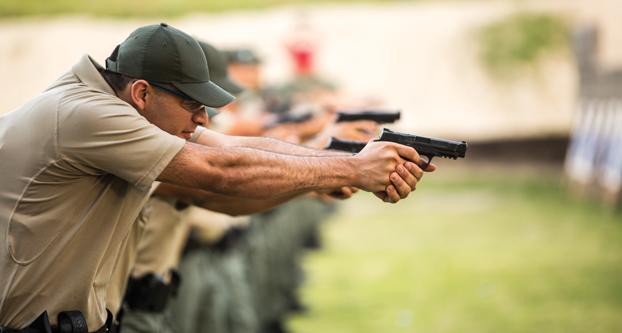Fresno State’s criminology 108 class, officially known as Directed Policing, transforms its students into Fresno County reserve deputy sheriffs in two years.
The program is unique. It’s the only one of its kind offered in any community college, state school or university in California.
The instructor of the program, Kingsburg’s Chief of Police Neil Dadian, began his career in Fresno State’s criminology Directed Policing class when he graduated from it back in 1981.
“The program started in 1959 with the sheriff’s office working with some students and teaching them basic campus security work,” Dadian said. “That evolved to the sheriff’s office training students to be reserve deputies and then that evolved into this course.”
The course is broken up into four semesters and each semester requires over 120 hours of training or volunteer patrol per semester. The training includes firearm practice, handcuffing, exposure to chemicals and pepper spray among other things, according to Rene Enriquez a senior criminology student.
“This program helps you grow more and mature. You’re training for the police so you can’t mess around,” Enriquez said.
By the time students graduate they have one year of experience and a part-time job upon completion of the program. Dadian describes it as an internship on steroids.
To qualify for the program, the student must be 21 by the time of graduation, a U.S. citizen and have a valid driver’s license. They also have to pass a polygraph test, psychological assessment, medical exam and a background check.
Even after admitted, the program typically loses over a third of its students in the first hour of training — which they refer to as “day one hour one” — where they physically push their students to test their endurance and commitment to the program.
“The day one hour one was the hardest because now I see why they do it. It’s because you don’t want to work with the ones that were throwing up and crying,” said Fresno County Reserve Deputy Sheriff Maria Ledesma. “I wouldn’t want them working with me because they’re going to fall back and they’re not going to back me up. Why am I going to put myself in danger for someone who doesn’t keep up?”
The law enforcement training they receive was described by Dadian as “quasi-military-type” training.
“Being a female in this program is not easy. You see an intimidation in the guys but it’s not always like that,” Ledesma said. “You have to prove yourself as a female. I have to prove that I can do as much as they can do.”
The academics are just as demanding as the training, requiring that students devote a majority of their time to the program thus creating a different “college experience” compared to many students at Fresno State.
“Our normal student comes to the university in a pretty sterile environment and they learn,” Dadian said. “These guys are out working in the real world where crime is occurring, where force is necessary, where violence is prevalent, in addition to coming back and going to school.”
Students come out of the program as reserve deputy sheriffs and with more than just a diploma and certificate.
“They have greater focus, they have something more than the average student has,” Dadian said. “They have something to lose, they have their status as peace officers to lose
Former criminology 108 students are predominantly working throughout the criminal justice system in the Central Valley.
“The whole program itself changes you. For some, you become an adult,” Ledesma said.
The program accepts new students each fall and seeks out individuals who are prepared to devote themselves to this field.
“We’re looking for leadership and turning the students into leaders,” Dadian said.




